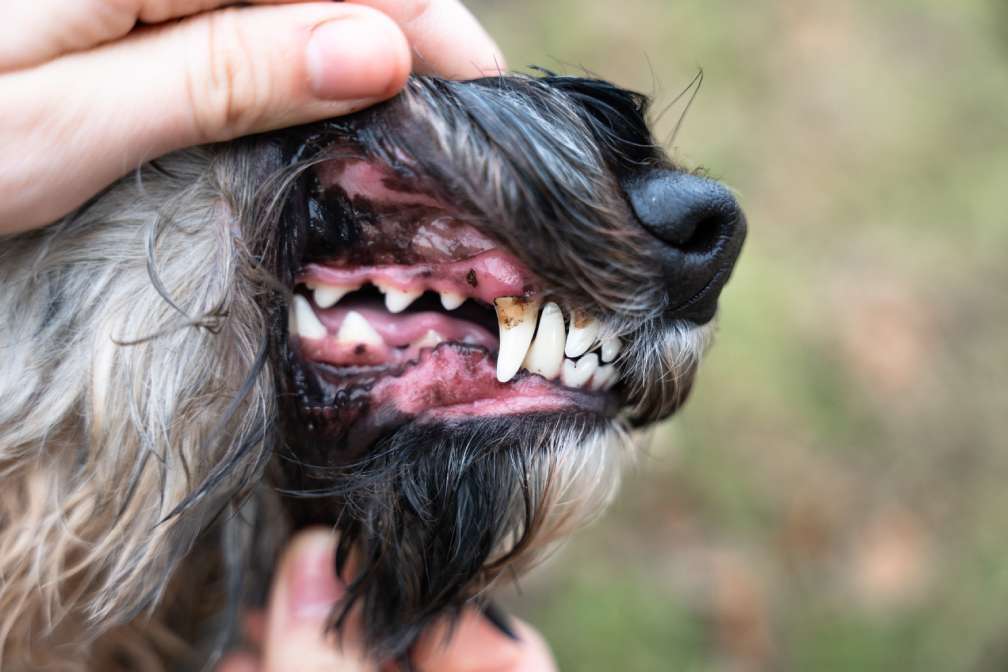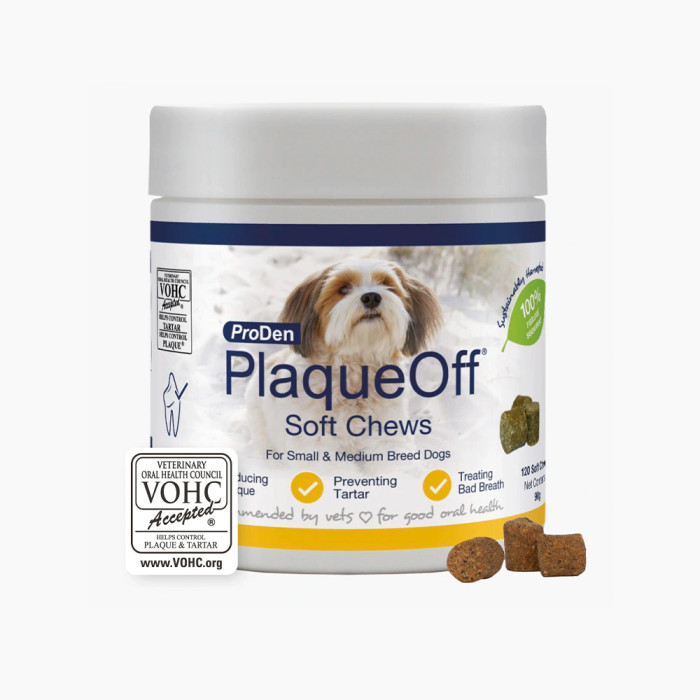Understanding and Managing Plaque in Dogs: A Guide for Pet Parents
In this article:
As pet parents, we understand the importance of providing our furry companions with the best care possible. While we focus on their nutrition, exercise, and overall well-being, we might sometimes overlook a crucial aspect of their health – their dental hygiene. Just like in humans, dental health plays a pivotal role in a dog’s overall health and happiness. One of the most common dental issues that dogs face is plaque buildup. In this article, we’ll delve into what plaque is, how it can impact your dog’s dental health, and what you can do to prevent and manage it.
Understanding Plaque in Dogs
Plaque is a sticky, colourless film of bacteria that forms on the teeth and gumline. It is a natural occurrence and develops when food particles, saliva, and bacteria combine in your dog’s mouth. If not properly managed, plaque can lead to a variety of dental problems, including gum disease, tooth decay, and bad breath. As plaque accumulates, it hardens and turns into tartar, which is even more difficult to remove.

Causes and Consequences
Several factors contribute to the formation of plaque in dogs. Poor dental hygiene, improper nutrition, and genetics can all play a role. Chewing on hard objects like bones and toys can also help reduce plaque buildup, as it mechanically cleans the teeth. However, inadequate dental care can lead to serious consequences. Plaque buildup can cause gingivitis (inflammation of the gums), periodontal disease, and even tooth loss. Additionally, the bacteria present in plaque can enter the bloodstream and potentially affect your dog’s organs, including the heart, liver, and kidneys.
Treating and Preventing Plaque in Dogs:
1. Regular Veterinary Dental Care
A crucial step in managing plaque is scheduling regular dental check-ups with your veterinarian. Professional cleanings under anesthesia allow the vet to thoroughly clean your dog’s teeth, removing both plaque and tartar. They can also identify any potential dental issues early on.
2. Home Dental Care
Implementing a daily dental care routine at home can significantly reduce plaque buildup. Brushing your dog’s teeth is the most effective way to remove plaque. Use a soft-bristled toothbrush and toothpaste formulated for dogs. Begin slowly, allowing your dog to get used to the process. Gradually increase the time and frequency of brushing.
3. Dental Chews and Toys
Dental-specific chews and toys are designed to help clean your dog’s teeth as they chew. They can help reduce plaque and tartar buildup while providing mental stimulation.
4. Diet Considerations
Opt for a high-quality dog food that supports dental health. Some brands offer kibble formulated to help scrape away plaque as your dog chews.
5. Oral Health Supplements
These products can be added to your dog’s food to help combat plaque-causing bacteria. They should not replace brushing your dog’s teeth, but they can provide some well needed additional dental care. ProDen PlaqueOff® contains a natural and unique kelp ingredient called A.N ProDen, which has demonstrated its efficacy in clinical trials by helping to control and reduce plaque and tartar buildup. The supplement is available in convenient options such as tasty bites, chews, and a powder that can be effortlessly sprinkled over your dog’s daily meals.
.
The Significance of Consistency
Consistency is key when it comes to preventing plaque and maintaining your dog’s oral health. Incorporating dental care into your daily routine may take time, but the long-term benefits are well worth it. Regular dental care not only prevents dental issues but also contributes to your dog’s overall well-being.
By practicing regular veterinary check-ups, implementing a consistent dental care routine at home, and considering diet choices, and oral health supplements, we can help prevent plaque buildup and maintain our dog’s health for years to come. Remember, a healthy mouth leads to a healthier, happier life for your beloved companion.
As pet parents, we understand the importance of providing our furry companions with the best care possible. While we focus on their nutrition, exercise, and overall well-being, we might sometimes overlook a crucial aspect of their health – their dental hygiene. Just like in humans, dental health plays a pivotal role in a dog’s overall health and happiness. One of the most common dental issues that dogs face is plaque buildup. In this article, we’ll delve into what plaque is, how it can impact your dog’s dental health, and what you can do to prevent and manage it.
Understanding Plaque in Dogs
Plaque is a sticky, colourless film of bacteria that forms on the teeth and gumline. It is a natural occurrence and develops when food particles, saliva, and bacteria combine in your dog’s mouth. If not properly managed, plaque can lead to a variety of dental problems, including gum disease, tooth decay, and bad breath. As plaque accumulates, it hardens and turns into tartar, which is even more difficult to remove.
Causes and Consequences
Several factors contribute to the formation of plaque in dogs. Poor dental hygiene, improper nutrition, and genetics can all play a role. Chewing on hard objects like bones and toys can also help reduce plaque buildup, as it mechanically cleans the teeth. However, inadequate dental care can lead to serious consequences. Plaque buildup can cause gingivitis (inflammation of the gums), periodontal disease, and even tooth loss. Additionally, the bacteria present in plaque can enter the bloodstream and potentially affect your dog’s organs, including the heart, liver, and kidneys.
Treating and Preventing Plaque in Dogs:
1. Regular Veterinary Dental Care
A crucial step in managing plaque is scheduling regular dental check-ups with your veterinarian. Professional cleanings under anesthesia allow the vet to thoroughly clean your dog’s teeth, removing both plaque and tartar. They can also identify any potential dental issues early on.
2. Home Dental Care
Implementing a daily dental care routine at home can significantly reduce plaque buildup. Brushing your dog’s teeth is the most effective way to remove plaque. Use a soft-bristled toothbrush and toothpaste formulated for dogs. Begin slowly, allowing your dog to get used to the process. Gradually increase the time and frequency of brushing.
3. Dental Chews and Toys
Dental-specific chews and toys are designed to help clean your dog’s teeth as they chew. They can help reduce plaque and tartar buildup while providing mental stimulation.
4. Diet Considerations
Opt for a high-quality dog food that supports dental health. Some brands offer kibble formulated to help scrape away plaque as your dog chews.
5. Oral Health Supplements
These products can be added to your dog’s food to help combat plaque-causing bacteria. They should not replace brushing your dog’s teeth, but they can provide some well needed additional dental care. ProDen PlaqueOff® contains a natural and unique kelp ingredient called A.N ProDen™, which has demonstrated its efficacy in clinical trials by helping to control and reduce plaque and tartar buildup. The supplement is available in convenient options such as tasty bites, chews, and a powder that can be effortlessly sprinkled over your dog’s daily meals.
The Significance of Consistency
Consistency is key when it comes to preventing plaque and maintaining your dog’s oral health. Incorporating dental care into your daily routine may take time, but the long-term benefits are well worth it. Regular dental care not only prevents dental issues but also contributes to your dog’s overall well-being.
By practicing regular veterinary check-ups, implementing a consistent dental care routine at home, and considering diet choices, and oral health supplements, we can help prevent plaque buildup and maintain our dog’s dazzling smile for years to come. Remember, a healthy mouth leads to a healthier, happier life for your beloved companion.




